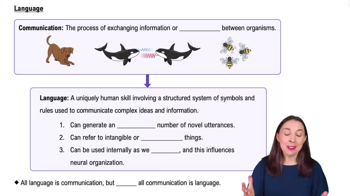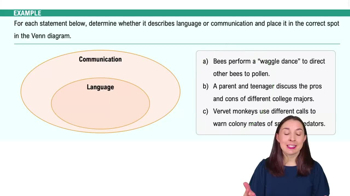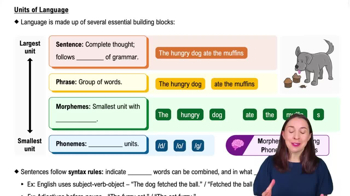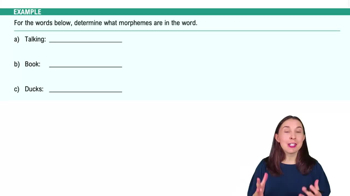Table of contents
- 1. Introduction to Psychology1h 43m
- 2. Psychology Research2h 20m
- 3. Biological Psychology2h 41m
- 4. Sensation and Perception28m
- 5. Consciousness and Sleep32m
- 6. Learning41m
- 7. Memory34m
- 8. Cognition37m
- 9. Emotion and Motivation35m
- 10. Developmental Psychology33m
- 11. Personality48m
- 12. Social Psychology41m
- 13. Stress and Health41m
- 14. Psychological Disorders44m
- 15. Treatment47m
8. Cognition
The Structure of Language
Struggling with Psychology?
Join thousands of students who trust us to help them ace their exams!Watch the first videoMultiple Choice
Which of the following statements are true of language?
I) Language can influence brain organization.
II) Language has a finite capacity for novel combinations.
III) Language can describe abstract ideas.
A
I & II.
B
I & III.
C
II & III.
D
I, II, & III.
 Verified step by step guidance
Verified step by step guidance1
Step 1: Understand the role of language in brain organization. Language can influence how the brain is organized, as it involves complex neural processes and can affect cognitive development and functioning.
Step 2: Evaluate the statement about language's capacity for novel combinations. Language is known for its infinite generativity, meaning it can produce an endless number of novel sentences and ideas, which contradicts the statement that it has a finite capacity.
Step 3: Consider the ability of language to describe abstract ideas. Language is a powerful tool for expressing abstract concepts, such as emotions, thoughts, and philosophical ideas, which are not tied to concrete objects or experiences.
Step 4: Analyze the given options based on the evaluations of each statement. Determine which combinations of statements align with the true characteristics of language.
Step 5: Conclude that the correct answer is the combination of statements that accurately reflect the properties of language, specifically I and III, as they are true based on the analysis.







